Over the Wall to play Beethoven in Jerusalem
The Ramallah Orchestra’s journey through – and over – Israeli barriers to star in the Holy City.
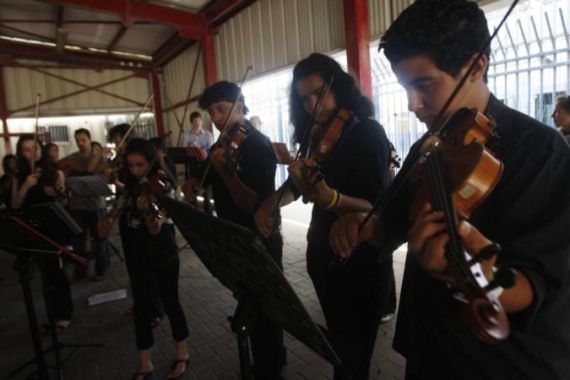
Jerusalem – Beethoven’s 4th Symphony has inspired countless thousands of musicians since it was first performed more than two centuries ago. Yet few, it’s safe to say, have risked arrest and prison time just to play this magnificent piece of music.
Enter the Ramallah Orchestra, made up largely of Palestinian musicians in their teens and 20s, accompanied by 15 or so visiting teachers and performers from Europe and the US. The orchestra is a project of Al Kamandjati, the Ramallah-based music school. For the Palestinians in the orchestra, Beethoven’s music makes up only part of the story.
Keep reading
list of 4 itemsInside the pressures facing Quebec’s billion-dollar maple syrup industry
‘Accepted in both [worlds]’: Indonesia’s Chinese Muslims prepare for Eid
Photos: Mexico, US, Canada mesmerised by rare total solar eclipse
The concert venue was in the Old City of Jerusalem, a holy place embedded deep inside the collective dreams and history of the Palestinians, yet denied them by a combination of bureaucracy and concrete. For the Jerusalem concert, some of the musicians had managed to obtain the permits Israel allows for special occasions.
But on this hot summer day in Palestine, five members of the orchestra were not so lucky. To play with their orchestra in the Holy City, the musicians would resort to the otherwise unthinkable: climbing over the Separation Wall.
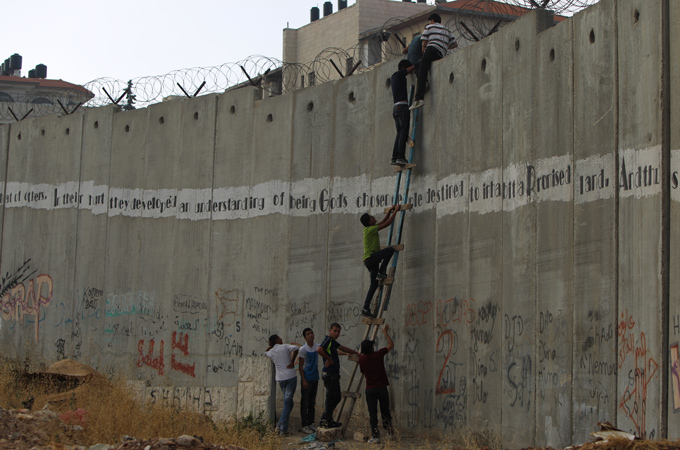 |
| Palestinians use a ladder to get over the Separation Wall [EPA] |
Their journey started in the early afternoon, in the stone and copper courtyard of Al Kamandjati’s headquarters in Old Ramallah. Three dozen young Palestinian musicians and visiting accompanists climbed aboard a tour bus, instrument cases slung over their shoulders, renewing an annual Jerusalem ritual.
For Palestinians, Jerusalem is becoming an imaginary city. Though barely 20 kilometres separate Ramallah from the walls of the Old City, reaching Jerusalem is increasingly less a physical journey than an exercise of the mind and spirit.
The city has been effectively sealed off by massive physical and bureaucratic barriers, while ironically being declared “united” by Israel, the authority in control during this period of the city’s 5,000-year history.
To prove that, Israel’s Minister of Public Security recently shut down a children’s theatre festival and puppet show at the Hakawati, East Jerusalem’s Palestine National Theatre, because the festival had allegedly received funds from the Palestinian Authority. The PA is confined to the West Bank, but its position – backed in word if not in deed by the most of the world’s nations – remains that East Jerusalem should be the capital of a sovereign nation called Palestine.
A trip in two worlds
Now the lucky permit holders of the Ramallah Orchestra would be reconnected, if only for a few hours, with their holy city. (Al Quds, the Arabic name for Jerusalem, means “The Holy.”) But the five musicians – one of the orchestra’s four violists, both of its timpani players, one of the double bass players, and a gifted violinist – had been told they would need the magnetic identification cards Israel is implementing for its permit regime.
According to Al Kamandjati’s director Ramzi Aburedwan who went to apply, “They said, ‘We don’t have the magnetic cards until July 10′” – days after the concert. “It’s f..king crazy,” Ramzi said. In an orchestra of only 37 people, the contributions of these five musicians was vital. If the Ramallah Five couldn’t participate, Ramzi said, he would cancel the concert.
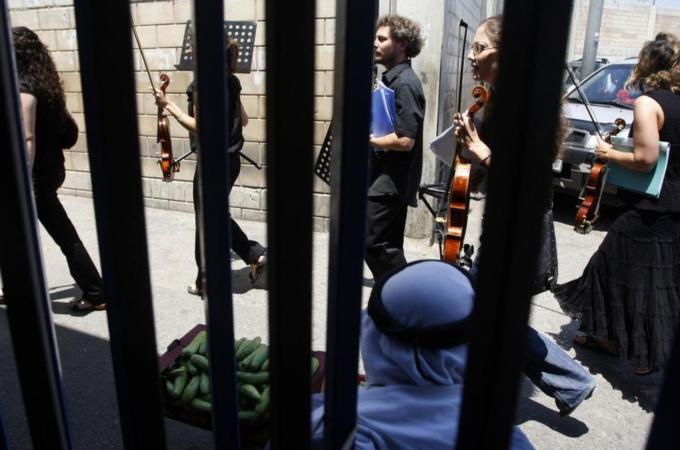 |
| Musicians pass through turnstiles [Reuters] |
The bus arrived at Qalandia military checkpoint, an exhaust-choked border crossing where hot, fuming drivers jockeyed for position, funneling into a single line before submitting for inspection. Vendors selling kebab, tissue packets, pillows, bottles of water and verses from the Koran weaved through the knots of vehicles and the plastic litter and chunks of broken concrete.
The bus inched forward. Here, where the massive wall separates Ramallah from Jerusalem, the Ramallah Five would try Plan B: Sit in the back of the bus, hoping the soldiers would somehow get lazy and check only the foreign passports and approved permits. As part of this plan, musicians holding the proper documents were strategically placed towards the front of the bus.
Three Israeli soldiers came on board, their American-made M-16s rifles slung around their shoulders, and began their inspection. One of them, baby-faced, with honey-blond hair, appeared to still be in high school. The soldiers checked the passports in the front row, then conferred, apparently discussing whether to check the whole bus. After some barked orders from a radio clipped to one of the soldier’s uniforms, they moved toward the back. Plan B, it appeared, was not going to work.
Within minutes nearly all of the Palestinians, even the ones holding proper papers, had been ordered off the bus. Permits or not, they would not be allowed to cross the checkpoint in relative dignity, like the foreigners who remained on the air-conditioned bus. Instead, they would walk past the red metal benches of the “passenger lounge,” surrounded on three sides by blue vertical bars, then pass down a long corridor of silver bars, akin to a cattle chute on a western ranch, except for at the end, they would be required to move through multiple 2.5-metre-high turnstiles, before ending up jammed with dozens of other Palestinians in front of yet another blockade.
Opus in the sun
The bus waited on the other side. Montasser Jebrini, a Palestinian clarinetist now studying in France, was riffing on the hot pavement, playing a solo performance of “Helwadi” (Beautiful Girl), the song made famous by the Lebanese singer Fairouz. Montasser said he believed he had been allowed to stay on the bus because he passed for a European or Anglo-American. “I am glad to be here,” he said, “but I feel bad it’s just because my skin is lighter, while my friends have to walk through the checkpoint.”
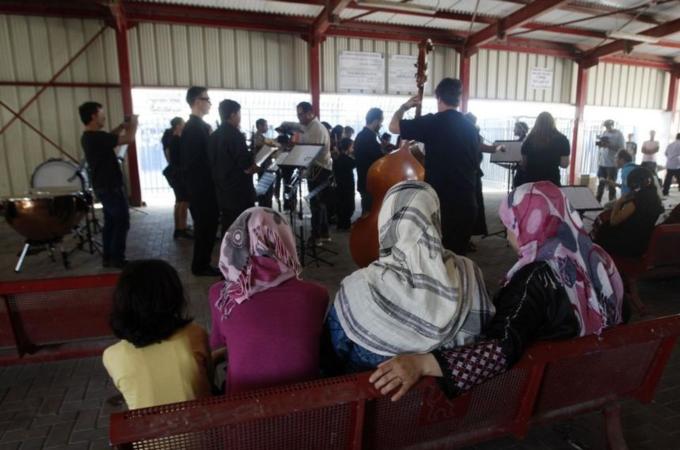 |
| A performance at the Qalandia checkpoint [Reuters] |
In the parking lot, Simon Hewitt Jones, the visiting British soloist scheduled to perform the Mendelssohn that evening, stepped off the bus with his violin.
Other musicians broke out their instruments, and they began jamming: Violins, viola, cello, French horn, trumpet, clarinet, performed by an American, three Brits, a Frenchman, an Irishman, and a Palestinian. Mozart’s “A Little Night Music” gave way to the Mendelssohn (“opus baking in the sun,” someone quipped), then morphed into Morrison’s Irish Jig, led by Johnny McBride, a fiddler from Northern Ireland.
The whole tableau was set against the backdrop of gun turrets, spindly red-and-white surveillance towers, and the supposedly impenetrable wall.
“It’s pretty threatening,” said McBride. “But not altogether unfamiliar. For the first half of my life, this is what Northern Ireland looked like.”
Plan C
Steps away, on the Ramallah side, separated by more walls of bars, the Palestinian teenagers waited in the scrum. Every so often, above the turnstile, a red light turned green, a click sounded, and three or four more people passed through to place their possessions on a conveyor belt, hold up their permits to a dull green bullet-proof window, and wait as bored-looking soldiers on the other side inspected the documents and waived the permit holders through.
But there were only nine permits for 14 musicians, and those without couldn’t talk their way through. And so the Ramallah Five were turned away. They clicked their way backward through the turnstiles and cattle chute to the Ramallah side, denied Jerusalem and uncertain what to do next. They had to come up with a Plan C.
One or two at a time, Palestinian string players met at the bus. Soon all of them had arrived, except for the Ramallah Five. “They couldn’t get through,” someone said. “They said to go on to Jerusalem. They will try to join us somehow.”
The passengers rode south in silence for a time, wondering if the concert – in the Old City on the grounds of the French church St. Anne’s – would have to be canceled.
“Hey,” someone said to the musicians back on the other side, “you want to go to Jerusalem?” He sat with a group of men smoking cigarettes and drinking coffee, and nodded towards a van. “Yes,” the musicians said. “You are five? It will be 250 shekels” – about $70 dollars, or $14 per musician.
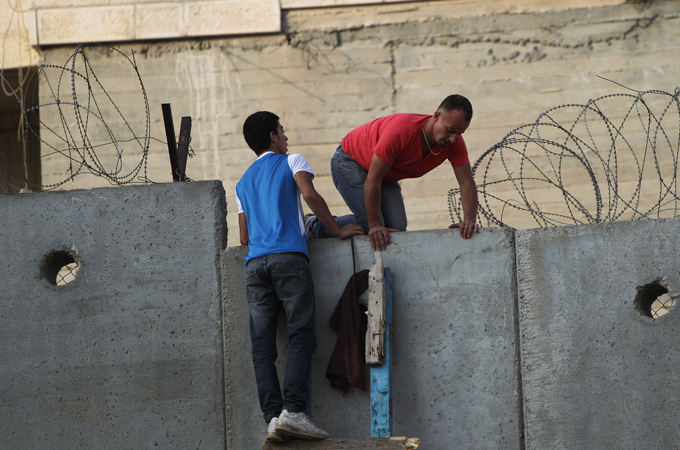 |
| Dealing with razor-wire is part of wall jumping [EPA] |
The man offering passage turned to his partner. “Get these guys to Jerusalem.” The Ramallah Five piled into a van. The door slid shut and the driver began working two phones, making arrangements. “Give me the money,” he said. They haggled over the price, agreeing on 40 shekels (about $11) each. “But you have to pay now,” the driver said. The man gave them his phone number, and told them to call when they reached Jerusalem. Apparently he wanted satisfied customers.
A short time later the driver pulled over, stepped into a building, and emerged with a long ladder, which, when extended to its full length, reached the top of the wall. “Come,” he said. The five musicians approached the towering slab of concrete, which reached at least 7.5 metres high.
Back on the bus, the mood of the rest of the musicians was subdued. As it rolled south, it was still unclear whether the five musicians would somehow make it through to Jerusalem.
Up and over
A string player went up the ladder first, gazing up to the top of the wall, where nasty-looking loops of razor wire presented a sharp and dangerous obstacle. But the Palestinian “trafficker”, who had scrambled to the top of the wall, had already cut the wire; now, he sat beside the ladder at the top of the wall, and, with the back of his forearm, simply swept the loops of wire aside, like a curtain. They must do this all the time for illegal Palestinian workers, the musicians realised. Then the Palestinian trafficker pulled a long knotted rope from a plastic bag, looped it around a metal post at the top of the wall, and dropped it down to the other side.
”Why
history. What I don’t understand is why you’re treating us this way…”]
One by one, the young musicians mounted the ladder, sat atop the wall, grabbed the rope, and slowly slithered down, trying to use the knots as footholds. It wasn’t easy; the knots were small. Halfway down, one of the string players saw a vehicle approaching on the narrow access road. He froze; was this a soldier coming to arrest him?
“Don’t worry,” the man called down, “it’s a local Palestinian.” Still, the violist began to imagine what would happen if he were arrested. From the midpoint, perhaps 4.5 metres above the ground, he fantasised about being taken to jail, and telling his fellow Palestinian inmates, to boisterous laughter, that he’d been arrested for intending to play music. Then, still sliding down the rope, he imagined the speech he would give to the judge in Israel:
“Why am I guilty? The only thing that I am doing is trying to make my music for people in Jerusalem. For your information, I have learned about your suffering. I was shocked by this [Israeli] history. What I don’t understand is why you’re treating us this way?” the violist thought.
The hard ground at the end of the rope snapped the musician from his reverie, and he looked up to see the timpanist toss the bag of his sticks down towards him from the top of the wall. Now the violinist was coming down. But something was wrong; he was having trouble telling how far he was from the ground. He jumped too early, landing on his feet and falling hard onto his back. Everyone laughed because it seemed he was okay. From the top of the wall, the bass player tossed him his violin, in its case.
Now all five musicians were together, on the Jerusalem side of the wall. The entire operation had taken five minutes. They brushed themselves off and entered a restaurant for kanafe, the pizza-shaped Palestinian dessert made of sweet cheese and pistachios. “That kanafe was very good,” recalled the viola player. “Then we called to see where the bus was.”
Standing ovation
The Ramallah Five appeared on the road beside the bus, smiling broadly and bounding up the steps to cheers from the orchestra. One of them showed a few of the passengers a video of the ladder, and the wall, and two of the musicians climbing towards the sky: proof of their deed.
Twenty minutes later, the orchestra arrived on the tranquil grounds of St. Anne’s, a French church built during Crusader times. An old French priest welcomed them with a soft smile and a heavy accent; tourists wandered quietly through the garden, or rested on shaded benches. A French flag flapped from the steeple. It was as if Qalandia and the wall had never existed.
The musicians disappeared into the cavernous church to rehearse Beethoven’s 4th Symphony, and the Mendelssohn Violin Concerto. The sound of a violin solo drifted out, joined now by the entire orchestra; trombone, oboe, flute, and the pounding of the timpani.
But the violinist who had climbed the wall fell ill, vomiting repeatedly. It was shock, a doctor told him, from the hard landing at the wall. He would not play the Old City that night.
The other 36 members of the Ramallah Orchestra would, however. A little after 8pm, strings whispered the haunting first notes Beethoven’s 4th, in a minor key, as 200 visitors filled the chairs of the old church. They had no idea what it had taken to get to Jerusalem to play Beethoven.
But perhaps they sensed something. Moments after Diego Masson, the visiting French conductor, made his last thrust, and the final notes of the 4th echoed off the walls, the audience rose in a sustained, joyful ovation.
Sandy Tolan is associate professor at Annenberg School for Communication and Journalism at the University of Southern California, and author of The Lemon Tree: An Arab, a Jew, and the Heart of the Middle East. Follow him on Twitter: @RamallahCafe